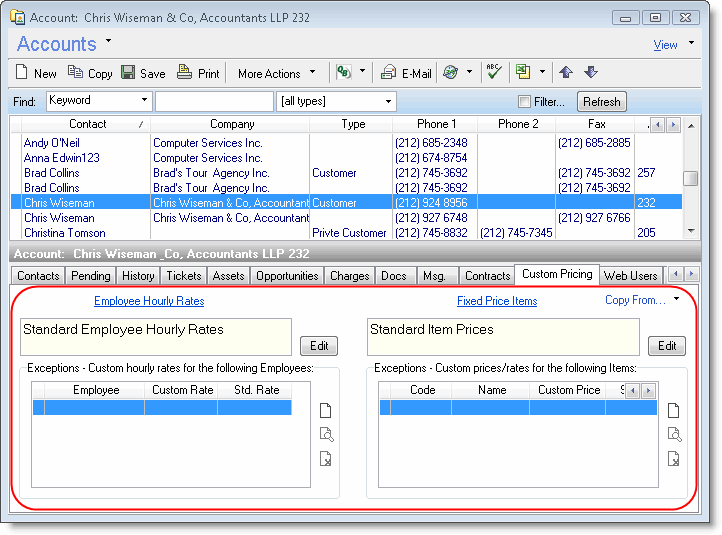Custom Pricing
Custom Pricing lets you set unique prices for different Accounts or Contracts. Once you define custom prices for an Account or Contract, these prices will be used automatically for every charge logged for Accounts or Contracts.
You can also manually adjust the prices while creating a Charge.
This sections explain how to define Custom Pricing.
When should I use Custom Pricing?
By default, the standard employee hourly rates and item prices will be used automatically.
You should use custom pricing only when you want to use a different set of prices or rates for a specific Account or Contract. For example, custom pricing may be used to set a global 10% discount for a customer, or to set unique hourly rates for employees for a specific Account. To do so, set a Custom Price for the Account or Contract and define the adjustments. Once set, the system will automatically use the custom prices or rates instead of the standard ones when Charges are logged under this Account or Contract. When defining Custom Pricing, you can choose between a global custom price level or a per-item price.
Account level vs. Contract level Custom Pricing
Custom Pricing can be defined at the Account level or Contract level.
When custom prices are defined for the Contract, the Account's custom pricing settings are ignored, and the Contract's price settings are used. You can read more about this under Contract Level vs. Account Level Custom Pricing.
Global Settings vs. Exception Rules
The global price/rate settings determine the price/rate adjustment for all employees, or for Items for a specific Account or Contract. For example, a specific Account may enjoy a 10% discount off all products, or a reduced hourly rate of $100/hour for all employee time, etc.
In addition to global settings, you can define rule exceptions for specific employees or Items to override the global settings and be used when the system needs to determine the price/rate for that specific item/employee. For example, Natalie's hourly rate may be set as $80, and this will override Natalie's standard hourly rate, and the global employee hourly rate.
Standard prices
The custom price settings replace the standard item/employee rate.
Standard employee rate - the employee's rate as defined in the employee tab.
Standard item price - the Item's price as defined in the Item record.
Setting Up Custom Pricing
You can define custom pricing from the Custom Pricing tab found in the Account and Contract windows.

The Custom Pricing tab is divided into two sections:
- Custom Employee Rates
- Custom Fixed Prices
Custom Employee Rate
Custom Employee Rates affect items where the price source is defined as 'By Employee Rate'.
These items can be of the following types:
- Labor items using hourly rates by employee
- Expense items using hourly rates by employee
You can define custom rates for employee hourly rates for all employees, or for specific employees. This will override the employee rate defined in the Employee tab, when items using 'By Employee Rate' as the price source are being charged for this Account or Contract.
Custom Prices for Fixed Price Items
Custom Fixed Prices affect Items where the price source is defined by 'Fixed Price'.
These items can be of the following types:
- Products/parts with a fixed price
- Labor items with a fixed price (using units or hours)
- Expense items with a fixed price (using units or hours)
You can define custom prices for all items or for specific items. This will override the items' fixed price whenever the item is used for this Account or Contract.
Custom Employee Rates
Custom Employee rates can be defined in two ways:
- Define global rate rules for all employees
- Define exception rules for specific employees
